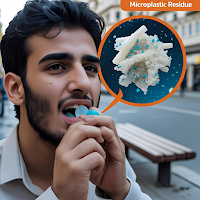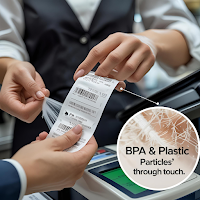.png) |
| Say No To Plastic |
In today's world, we're all trying to reduce our use of plastic by carrying reusable bags, avoiding bottled water, and saying no to plastic straws. Did you know that plastic can be found in unexpected places? Despite our best efforts, plastic finds its way into our homes in unexpected ways.
In this blog, we'll look at five common items that contain hidden plastic and how to replace them with better alternatives. This knowledge will enable you to make smarter, more environmentally friendly decisions in your daily life.
 |
| In Teabag plastic—literally! |
1. Tea bagsYes, the soothing cup of tea you drink every day could be steeped in plastic—literally! Many commercial tea bags are sealed with a plastic polymer called polypropylene, which helps the bag maintain its shape.
Why it matters: Adding hot water can cause microplastics to leach into the tea. You're not just drinking tea; you could also be drinking plastic.
- Select loose-leaf tea and use a stainless steel infuser.
- Look for brands that explicitly state "plastic-free" tea bags.
 |
chewing gum is made
from plastic |
2. Chewing gum.It may surprise you, but most modern chewing gum is made from plastic-based synthetic rubber. Unlike natural gum made from tree sap (chicle), modern gum bases are similar to the plastic used in tires.
Why it matters: Unlike biodegradable materials, gum does not degrade on the ground. It sticks around, literally polluting the streets and harming animals.
- Choose brands with natural bases, such as Glee Gum or Simply Gum.
- To freshen your breath, use a healthy alternative such as clove or fennel seeds.
3. ReceiptThe receipt you get after shopping? Although many receipts appear to be regular paper, they are actually coated with BPA or BPS-laced thermal plastic. This coating allows the text to appear when printed without the need for ink.
Why it matters:
BPA (Bisphenol A) is a harmful chemical that can penetrate the skin and disrupt hormones. If you touch receipts frequently, you may be unknowingly exposed to toxic chemicals.
- "no receipt, please" whenever possible.
- Request digital receipts if available.
- Do not let children handle receipts.
4. Clothing (Yes, yours!)Many clothes, particularly fast fashion items, are made with synthetic fibres such as polyester, nylon, and acrylic. They are essentially plastics. Every time you wash them, they release microplastics into the water system.
Why it matters: Tiny plastic fibres end up in rivers, oceans, and drinking water.
- Select natural fibres such as cotton, hemp, or bamboo.
- Use a laundry bag that catches microfibers, such as Guppyfriend.
- Wash clothes less often and at lower temperatures.
5. Cans with plastic linersMost canned foods and drinks, including your favourite soda, contain a hidden layer of plastic inside the can. This lining, often made of BPA, is used to keep the metal from reacting with the food.
Why it matters: BPA, like receipts, can leach into food and drinks, particularly acidic ones like tomatoes.
- When possible, buy foods that are fresh or packed in glass.
- If you use canned goods, choose brands that label their products as BPA-free.
Final Thoughts.
Plastic is everywhere, even in things we don't think about. But now that you know the truth, you can take simple steps to avoid encountering hidden plastic in your daily life. Remember that the goal is not perfection, but progress.
Making healthier choices benefits the entire planet. 🌍
✅ Tips for Reducing Hidden Plastic: Read labels and check online before purchasing new products.
- Support brands that are dedicated to sustainability.
- Share this blog with others to increase awareness.

.png)





.png)
Comments
Post a Comment
"Tell us what you think about plastic pollution!"